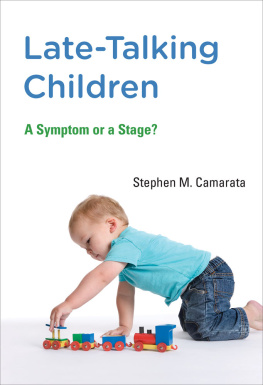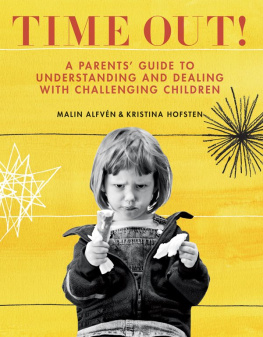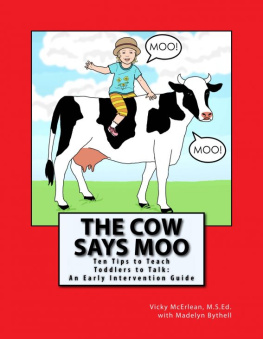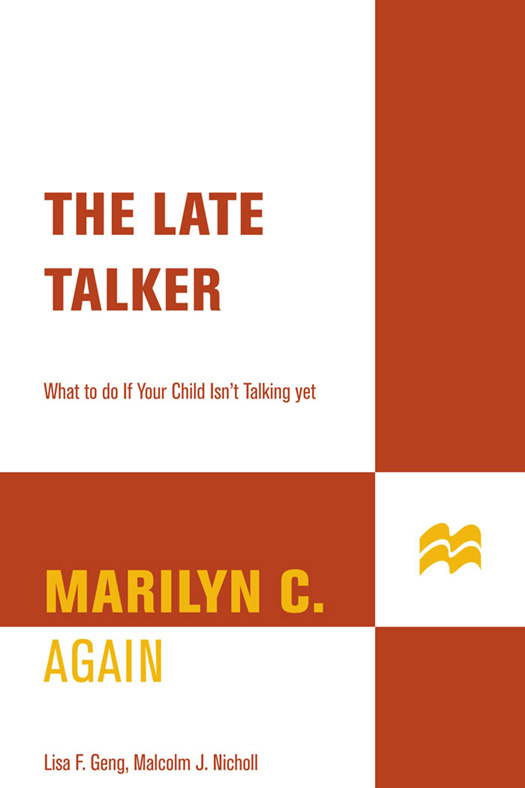The Late Talker
The Late Talker
What to Do If Your Child Isnt Talking Yet
Marilyn C. Agin, M.D., Lisa F. Geng,
and Malcolm J. Nicholl
St. Martins Press  New York
New York
A Note to Readers
This book is for informational purposes only. It is not intended to take the place of individualized medical advice from a trained medical professional. Readers are advised to consult a pediatrician or other qualified health professional regarding their childrens speech difficulties or other medical problems before acting on any of the information in this book.
THE LATE TALKER . Copyright 2003 by Marilyn C. Agin, M.D., Lisa F. Geng, and Malcolm J. Nicholl. All rights reserved. Printed in the United States of America. No part of this book may be used or reproduced in any manner whatsoever without written permission except in the case of brief quotations embodied in critical articles or reviews. For information, address St. Martins Press, 175 Fifth Avenue, New York, N.Y. 10010.
www.stmartins.com
Library of Congress Cataloging-in-Publication Data
Agin, Marilyn C.
The late talker : what to do if your child isnt talking yet / Marilyn C. Agin, M.D., Lisa
F. Geng, and Malcolm J. Nicholl.1st ed.
p. cm.
Includes bibliographical references (page 207) and index (page 223).
ISBN 0-312-28754-2
1. Language disorders in children. 2. Speech disorders. 3. ChildrenLanguage. 4. Slow learning children. I. Geng, Lisa F. II. Nicholl, Malcolm J. III. Title.
RJ496.S7 A357 2003
618.92'855dc21
2002035993
First Edition: April 2003
10 9 8 7 6 5 4 3 2 1
Contents
Acknowledgments
First and foremost, all three authors wish to thank the many parents who allowed us to share their stories and their childrens stories with you. A special thanks to Cindy Mustafa for research assistance and to the numerous professionals who took the time to explain how their techniques can be beneficial for any late talker. We are particularly grateful for Dr. Paula Tallals thoughtful foreword. We are also appreciative of Heather Jacksons skillful, thorough editing, which helped structure a more readable book.
MARILYN C. AGIN
I want to thank my husband, Lennie, for his love and patience, and my children, Gabby and Julian, for becoming so self-sufficient and understanding during the writing of this book. And to all my friends who appreciated that my reclusion was no reflection on them. I also want to acknowledge Sandra Ginsberg, Assistant Commissioner of the New York City Early Intervention (EI) Program, for her support, and thanks to my young patients and their families, who have taught me so much and who have given me the inspiration to write this book.
LISA F. GENG
A special thanks to my husband, Glenn, for his love, encouragement, and support while I was busy writing this book. Thanks to my two boys, Dakota and Tanner. Your communication delays were a motivating wake-up call to do something to help both of you and others. Your success from early intervention is an inspiration, providing hope for all late talkers. Without you there would not have been a CHERAB Foundation and the greater awareness of speech challenges that has helped so many others, and this book would not have been written.
MALCOLM J. NICHOLL
To Sandyeternal gratitude for understanding the lost weekends, and for support and insight when needed the most.
Foreword
There are many reasons why a child might be a late talker. The most well-understood reasons relate to the fundamental building blocks on which speech and language development depends, including hearing, motor, and cognitive systems. Indeed, because language development depend on so many systems working together efficiently, developmental language impairments are among the most prevalent of all developmental disabilities, affecting an estimated 20% to 30% of all children. Language impairments are well known to accompany hearing loss, oral structural or motor deficits affecting the speech musculature, as well as syndromes where there may be cognitive impairments (including autism, Fragile X, and Downs Syndrome).
However, even when these known causes of language impairments are accounted for, there remains a large number of children who experience difficulty developing speech and language for unknown reasons. A recent epidemiological study funded by the National Institutes of Health demonstrated that over 7% of five-year-old children entering school met the clinical diagnostic criteria for specific developmental language impairment of unknown origin. There are two very surprising things about these findings. First, the number is nearly twice as high as was previously reported in the scientific or clinical literature. Even more striking was the finding that over 70% of these children, who were found on testing to be significantly behind in their language development, had never previously been diagnosed or treated for their language impairment. How could this be?
Some late talkers have quite obvious deficits in speech production, such as the apraxic children who are the focus of this book. For these children their speech and language problems may be clearly recognized because their speech sounds very different from that of typical children their age, and in some severe cases may be virtually unintelligible or even nonverbal. However, other late talkers may have more subtle speech problems that are difficult to differentiate from the typical mispronunciations of young children. In addition, there are considerable individual differences within the normal range of how rapidly speech and language milestones are achieved. For example, a child may say pada tat when they mean pet the cat. If the child is eighteen months old, this would not be a cause for concern, while it would be for a child of four years. But exactly when should such a pattern of mispronunciation raise concern sufficient to lead to a formal speech and language assessment? Most parents, teachers, and even pediatricians have a hard time answering this and other questions pertaining to appropriate timing for reaching specific speech and language milestones.
It is important to understand that not all children with speech production problems have language problems, and conversely not all children with language problems have speech problems. In addition, children who have difficulty producing speech or language may or may not have equal difficulty perceiving (understanding) it. One of the problems that leads to difficulty in recognizing when a child is having significant difficulty with speech and/or language development is that there are several different component parts of language to consider. Language is comprised of phonology (the smallest units of sound that differentiates word meaning), semantics (vocabulary), morphology (word parts, including prefixes and suffixes), syntax (grammatical rules), and pragmatics (conversational rules). There are separate normal developmental milestones for each of these components, both for production and comprehension. To further complicate matters, children can have difficulty with one or more of these components of language while developing others well within normal limits. For example, it is not uncommon for a child to be learning individual vocabulary words normally, while struggling to learn how to string words together to form grammatically correct sentences.
Exactly how many vocabulary words or word combinations should be understood or produced at what age? Which rules of grammar develop at what age? How often are children who are delayed in language onset and/or are slow in progressing through the early language milestones (i.e., late talkers) likely to catch up as compared to remaining behind in various aspects of language learning? Are late talkers at risk for subsequent reading and other academic achievement problems? Are late talkers more likely to have behavioral problems such as attention deficit disorder?









 New York
New York